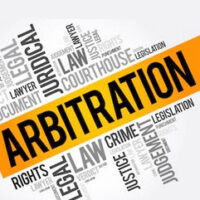The Basics of Arbitration and Mediation in the Construction Industry

When a dispute arises from a construction contract, litigation is often not the first option to resolve the matter. Many Florida construction contracts contain arbitration or mediation agreements. These are types of private dispute resolution that, if successful, address a dispute in a quicker and more effective manner than a traditional civil lawsuit.
How Does Arbitration Differ from Mediation?
It is important to understand the distinction between “arbitration” and “mediation” in this context. Mediation is an attempt to resolve a construction-related dispute through additional negotiation, often with the assistance of an impartial third-party mediator. The mediator does not act as a judge, however, but rather as a facilitator who assists the parties.
In contrast, arbitration involves submitting a dispute to a panel of one or more arbitrators, who then hear the case and render a decision (known as an “award”) that is legally binding on both parties. Arbitration is designed to take the place of litigation. This means that under most circumstances, the party that loses at arbitration cannot then seek to have a Florida court rehear the dispute.
How Does Mediation or Arbitration Actually Work?
Mediation and/or arbitration are often required under the terms of a construction contract. You should always carefully review any such provisions before signing a contract. But the parties can also agree to either form of alternative dispute resolution after the fact. But again, there should always be a written agreement making it clear everyone agrees to the process.
Arbitration and mediation often follows the practices of the American Arbitration Association (AAA), a non-profit organization that establishes rules governing mediation and arbitration procedures. The AAA does not actually resolve disputes itself. The parties themselves typically appoint their own mediators or arbitrators under a process set forth by the AAA, although if they cannot agree the Association will make the appointment for them.
The AAA also has special rules for construction-related disputes. There are actually four types of construction arbitration under the AAA rules:
- Regular Track Procedures;
- Procedures for the Resolution of Disputes through Document Submission;
- Fast Track Procedures; and
- Procedures for Large, Complex Construction Disputes.
Most construction dispute arbitration follows the Regular Track Procedures. This process basically mimics a traditional civil trial, where the arbitrator has broad authority to control the arbitration hearing itself as well as each party’s right to pre-trial discovery.
Fast Track Procedures are used for disputes where the amount claimed by either side does not exceed $100,000 (not including attorney’s fees and arbitration costs). As the name implies, this is a streamlined process designed to resolve disputes more quickly. There is an expedited process for approving arbitrators, and usually a one-day hearing.
On the other end of the spectrum, the AAA’s rules for “large, complex construction disputes” may be used when the amount in dispute exceeds $1 million. Unlike other types of AAA arbitration, the complex procedures usually rely on a panel of several arbitrators.
Speak with a Jupiter, Florida, Construction Lawyer Today
Arbitration is still a legal process, even if the rules differ from those of traditional courts. This means you should still work with an experienced Florida construction law attorney before entering into any arbitration or mediation agreement or procedure. Contact Linkhorst & Hockin, P.A., to schedule a consultation with a member of our construction law team today.
Source:
adr.org/sites/default/files/document_repository/Construction_Arbitration_Rules_7May2018.pdf
